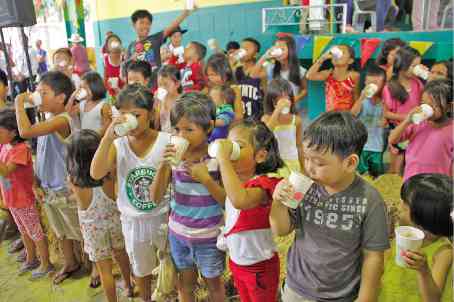
These Nueva Ecija children relish drinking carabao milk given during the “Gatas ng Kalabaw Festival” hosted by San Jose City government recently. More than 10,000 day care pupils in three regions will soon get free carabao milk for 120 days under a pilot project spearheaded by the Department of Social Welfare and Development and the Philippine Carabao Center.
—ANSELMO ROQUE
SCIENCE CITY OF MUÑOZ—Carabao milk will be given for free to more than 10,000 children under a pilot project of the Department of Social Welfare and Development (DSWD) and the Philippine Carabao Center (PCC) here.
The children, aged 3 to 5, are each given 200 milligrams of milk daily in day care centers in the towns of Aliaga in Nueva Ecija province (1,121 beneficiaries); Talibon town in Bohol province (1,652); and the towns of Damulog (1,270), San Fernando (3,033), and Maramag (3,018) in Bukidnon province.
The milk provisions are added to the regular meals served under the government’s supplementary feeding program.
“The milk comes from the yield of carabaos of small hold dairy farmers and is processed, packaged and delivered in ready-to-drink packs by the PCC-assisted cooperatives to the day care centers,” Arnel del Barrio, acting PCC executive director, said in a statement.
Del Barrio and Social Welfare Secretary Judy Taguiwalo signed a memorandum of agreement providing for the milk supplements.
“The farmers are paid accordingly based on the volume of milk they delivered to the PCC,” Del Barrio said.
She said the program would improve the nutritional status of children and boost the daily income of farmers. It would also help farmers develop sustainable milk-based livelihood enterprises such as bread, cheese and other food products.
Ma. Theresa Sawit, PCC senior research specialist, said the classrooms of the beneficiaries are provided with info graphics to remind them about the importance of drinking fresh milk.
According to a study by the National Food Research Institute, about 7.9 percent of children in rural areas are underweight and deficient in vitamins and minerals, and suffer from slow growth. —ANSELMO ROQUE